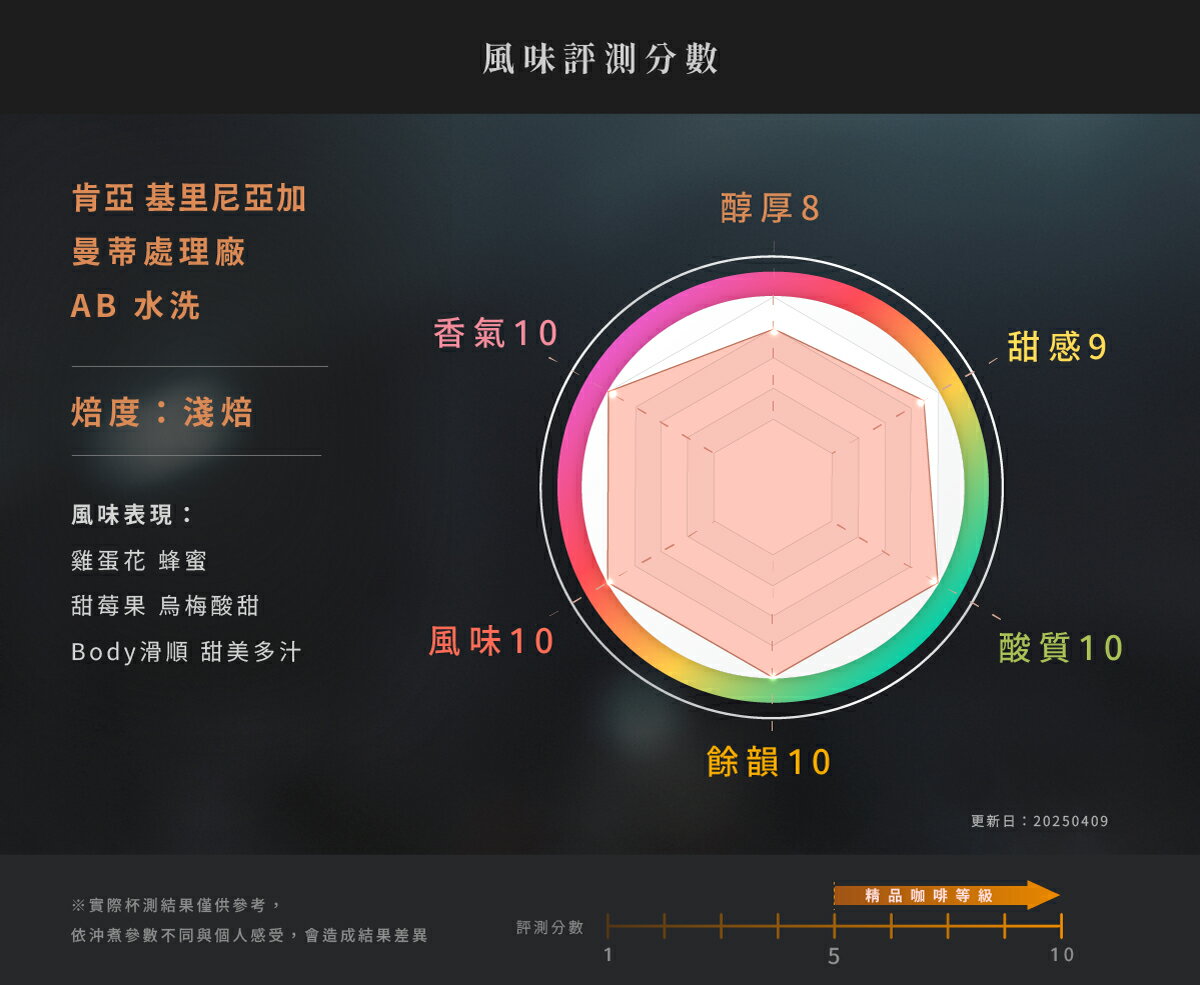

Kenya Kirinyaga Freshly Roasted Coffee Beans, options as follows:
Kenya Kirinyaga Karumandi AB Washed

-------------------
Kenya Kirinyaga Kiunyu AA TOP Washed








Coffee Flavor
The flavors of coffee are derived from the breakdown of various nutrients in the green coffee beans during roasting. Heat causes these compounds to degrade into a variety of aromatic molecular structures, resulting in a wide spectrum of flavors. High-quality coffee beans naturally possess a rich aroma that evolves at different temperatures—high, medium, and low—offering a delightful and nuanced experience worth savoring.
Kenya Kirinyaga Karumandi AB Washed
Egg Flower, Honey, Sweet Berries, Honey, Dried Plum Sweet and Sour, Smooth Body, Sweet and Juicy
Kenya Kirinyaga Kiunyu AA TOP Washed
Orange, Citrus, Yellow Lemon, Honey, Refreshing Juice, Clean and Bright

The Kiunyu Processing Plant was established in 1960 and is located in the Kirinyaga region of Kenya. It operates under the Karithathi Farmer Cooperative Society with the collaboration of 3,082 members. The region experiences an annual rainfall of 1,100mm and an average temperature ranging from 13°C to 24°C. The fertile volcanic soil and superior environmental conditions have contributed to the steady growth of coffee production. With the rising awareness of environmental conservation, the processing plant recycles wastewater back into the soil and encourages farmers to plant forests to maintain purification.
Karumandi Washing Station
The Karumandi Washing Station is a well-known processing facility in the Kirinyaga region, situated at an altitude of 1,700 to 1,800 meters. It primarily processes coffee varieties such as SL28, SL34, Ruiru 11, and Batian. At Karumandi, coffee undergoes traditional washed processing. After meticulous hand selection, ripe coffee cherries are promptly delivered to the washing station, where they undergo depulping, fermentation, and thorough washing to ensure purity and high quality. The beans are then sun-dried to achieve the ideal moisture content.
Kirinyaga coffee is renowned for its bright acidity and complex flavor profile. Common tasting notes include blackcurrant, berries, and citrus, accompanied by sweet caramel and chocolate undertones.
Kiunyu Washing Station
Established in 1960, the Kiunyu Washing Station is located in Kirinyaga and operates under the Karithathi Farmer Cooperative Society, supported by 3,082 members. The region receives an annual rainfall of approximately 1,100 mm, with an average temperature of 13-24°C. The combination of fertile volcanic soil and an optimal climate contributes to stable and growing coffee production.
With a rising awareness of environmental conservation, the washing station has implemented a wastewater recycling system, returning processed water to the soil while encouraging farmers to plant trees for ecological balance and sustainability.
----
Kenya is a prominent producer of East African specialty coffee, with a population of approximately 6 million engaged in the coffee industry, predominantly through smallholder farmers and cooperative societies. Kenyan coffee trees are primarily cultivated at altitudes between 1,400 meters and 2,000 meters, spanning regions including Ruiri, Thika, Kirinyaga, Mt. Kenya West, Nyeri, Kiambu, and Murang'a, with a focus on the foothills of Mt. Kenya and the Aberdare ranges. The main coffee-growing areas encircle Mount Kenya, each possessing its unique regional flavor profiles. For instance, the Nyeri region is renowned for its blackcurrant and prune flavors.
Many coffee-growing regions in Kenya strive to preserve their native forest ecosystems, protecting the natural gene pool and supporting the propagation of wild coffee varieties, thereby fostering diverse coffee trees. In 1930, the unique Kenyan coffee varieties SL28 and SL34 were developed and named by the Scott Laboratories. These varieties emerged in such a conducive environment, benefiting from the region’s commitment to maintaining a healthy and diverse coffee ecosystem.
Many coffee-growing regions in Kenya strive to preserve their native forest ecosystems, protecting the natural gene pool and supporting the propagation of wild coffee varieties, thereby fostering diverse coffee trees. In 1930, the unique Kenyan coffee varieties SL28 and SL34 were developed and named by the Scott Laboratories. These varieties emerged in such a conducive environment, benefiting from the region’s commitment to maintaining a healthy and diverse coffee ecosystem.

Arabica Coffee Varieties SL28 and SL34
In 1930, the unique Kenyan coffee varieties SL28 and SL34 were developed and named by the Scott Laboratories under a favorable native forest ecosystem.
SL28 possesses a mixed lineage of French Missionary, Mocha, and Yemen Typica. The original goal in breeding SL28 was to produce coffee beans that are both high in quality and resistant to diseases and pests for large-scale production. Although the yield of SL28 did not meet the initial expectations for large-scale production, its copper-colored leaves and fava bean-shaped beans offer excellent sweetness, balance, and a complex and varied flavor profile, along with distinctive citrus and prune characteristics.
SL34 offers a flavor profile similar to SL28, featuring complex and varied acidity along with an excellent sweet finish. It has a heavier and more intense body compared to SL28, and it also presents a cleaner taste. SL34 possesses a mixed lineage of French Missionary, Bourbon, and additional Typica heritage. While the bean appearance is similar to SL28, SL34 is better adapted to sudden heavy rains.
-----
Kenyan Coffee Grading
Flavor Grade: Ranked in the order of TOP, PLUS, FAQ. This batch has the highest flavor grade: TOP!
Bean Size Grade: The common three grades are AA, AB, and PB. This batch is AA grade.

(Coffee Processes)
The term "processing methods" refers to the process of transforming ripe red coffee cherries into dried green beans. Each method has its advantages and disadvantages, influenced by the natural environment and the specific needs of the coffee-producing region. As a result, different regions adopt the processing method most suited to their conditions. This batch uses the following washed processing methods, described below:
【Washed / Wet Processed】
Also known as the wet process, this method involves removing the skin and pulp of the coffee cherries before drying. The seeds are then fermented in water tanks to eliminate the remaining mucilage on their surface, followed by thorough washing and drying under sunlight or with mechanical dryers.
The washed process produces a cleaner and crisper flavor profile compared to the natural process. Coffees processed this way typically have lighter body, brighter acidity, and distinct fruit flavors. This method is often associated with specialty coffee due to its clarity and vibrant flavor expression.





JUSTIN INTERNATIONAL FOOD ENTERPRISE CO., LTD.
Tel: +886-3-358-6611
1st Floor, No. 30, Lane 120, Daxing Road, Taoyuan District, Taoyuan City
▶This product is covered by a NT$10 million product liability insurance.
▶Food Industry Registration Number: F-165601955-00000-0
▶ Our company’s cupper is certified as a CQI International Coffee Quality Appraiser.



Recommended Products


※ 詳細出貨及付款說明、發票、海外訂購須知...等,請 點擊進入